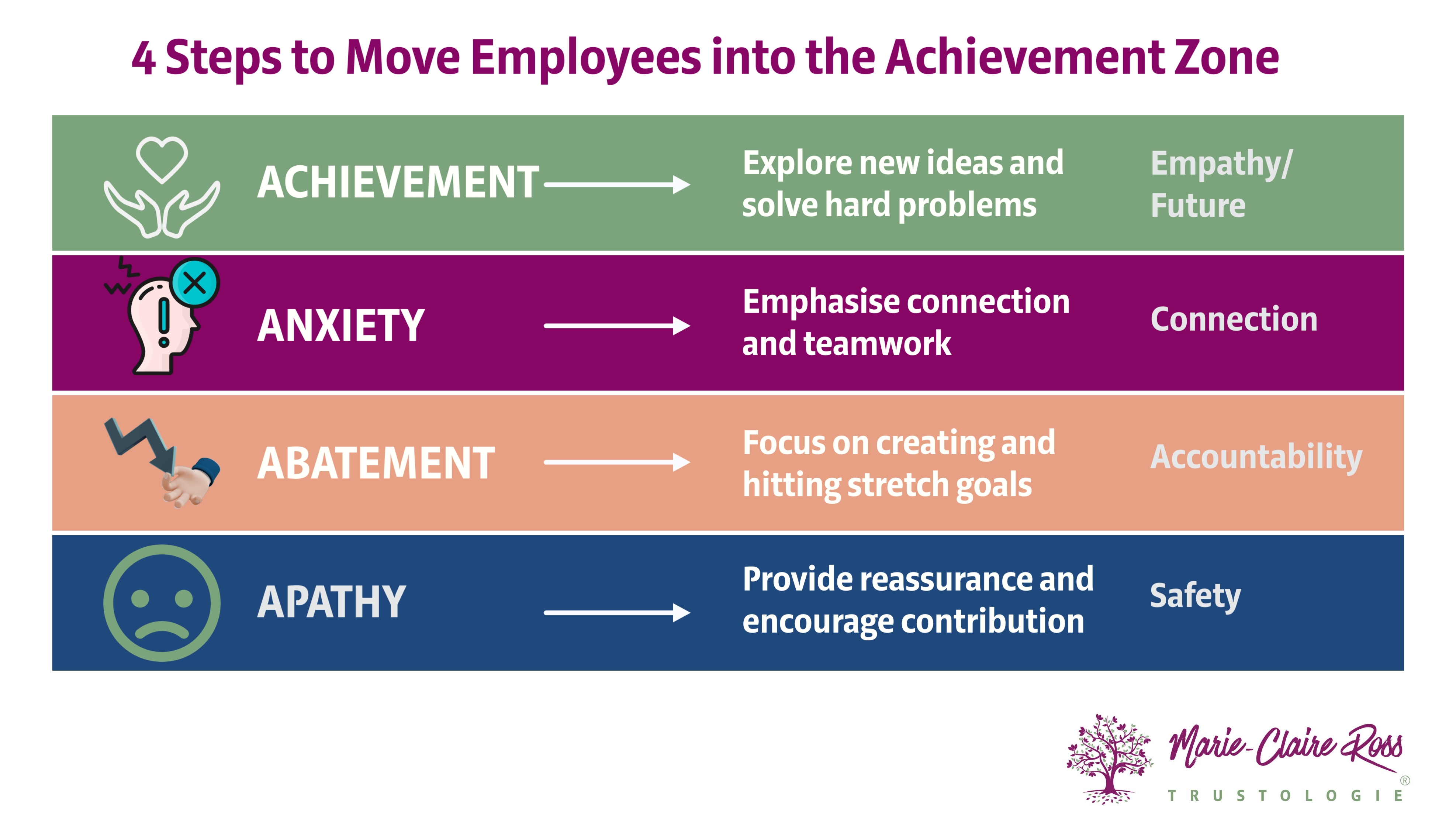11 min read
4 Practical Strategies for Better Emotional Management in the Workplace
I have a friend who often finds herself at the mercy of her emotions. Recently, she called me to rehash a confrontation she’d had with a group of...
Develop leaders, strengthen executive teams and gain deep insights with assessments designed to accelerate trust and performance.

Transform how your leaders think and perform with keynotes that spark connection, trust and high-performance cultures.

Explore practical tools, thought-leadership and resources to help you build trusted, high-performing teams.

Trustologie® is a leadership development consultancy founded by Marie-Claire Ross, specialising in helping executives and managers build high-trust, high-performing teams.

4 min read
Marie-Claire Ross : Updated on March 26, 2024

While it's common to assess employee performance based on tasks, uncovering hidden strengths can yield unexpected outcomes.
Several years ago, Google conducted an extensive research study on team performance known as Project Aristotle. To their surprise, they found that team success was not determined by who was on the team, but rather by how the team collaborated and interacted. The key factor was the leader's ability to exemplify the right behaviours, ultimately shaping the team dynamics. A leader who focused on making the team better than the sum of its parts.
When you are leading a team, it's common to look at individual performance and compare it to our own performance. Leaders will often tell me that they wished their report would be more like them. They often want 'mini-me's'.
This belief stops us from seeing the good in others and amplifying it. It also means we miss out on leveraging the untapped potential of our team.
As a leader, it's important for you to identify the hidden strengths of each of your employees. These are their unique innate abilities that are often not even acknowledged by the recipient.
Calling out these superpowers and describing the positive outcome will help your direct report recognise their gifts and use them more freely.
Take this a step further by encouraging team members to mention what innate skills they see in their team members. This helps your team have a more holistic view of each person's capabilities, so you can unlock your team's full potential. It also builds trust and connection in your team.
Here are some common employee talents that often get overlooked, but drastically improve team performance:
1. Emotional intelligence - Before the Google study, a common approach was to throw a team together with high achievers with equally high IQ's. But what many leaders have learnt to their detriment, is that it creates a competitive environment where team members are out for themselves. Team members who have high emotional intelligence can often balance out those who put themselves first.
One CEO of a start up bought in the smartest tech people he could find, only to discover they wouldn't work together. To balance out the team, he brought in women who had previous caring roles - nurses, teachers and even stay-at-home mothers. The result was a complete turn around in the young companies performance. Customers were considered at the highest level, team members were encouraged to get along and the competition was reduced.
Consider who in your team has the emotional intelligence to bring people together, reduce conflicts, lift people's mood, make work fun or help ease tension or fear? These capabilities are priceless when it comes to improving your team dynamics.
2. Flag potential issues - This is a contentious one, but it's important to understand this at a more nuanced level. We often have people on our team who are negative and complain about anything and everything.
But sometimes there are long-standing employees who are quick to notice an issue in a future plan because they are close to the customer or they know a lot about how things work. If they do flag an issue, we need to listen to them.
Too often, employees will confide in me about an issue that they highlighted that got shut down because their boss didn't want to hear anything negative. The result was a big failure that could have been avoided.
Consider who in your team is willing to tell the truth, even if it means they might get shunned by others?
3. Hungry for feedback - This one is pretty rare - the longer a person has been in their career. But a person who is always asking for corrective feedback and then doing something to improve is worth their weight in gold.
Consider who in your team openly receives feedback, rather than get defensive or shuts down? Reward these behaviours publicly to let your team know what's important.
4. Fixes the System - Most employees do the job that needs to be done. They ignore any process issues that need optimising or ways of improving the productivity of the team. When you have an employee who has some good ideas to fix a problem and wants to work on it, let them go for it. They are like gold.
Their willingness to work on what needs to be fixed ensure your team works more effectively. Their enthusiasm and focus on innovation and continuous improvement can be contagious to other team members.
5. Always looks on the bright side of life - Sometimes things go wrong and challenges seem insurmountable. Having someone on your team who believes that they can find a solution or soothes the team to move forward is a major asset.
Rather than see problems as a nuisance, they see them as another exciting challenge or an opportunity to add value. They seem to thrive with unclear direction or changing priorities. They demonstrate to the rest of the team how to manage ambiguity and adversity.
Consider who on your team approaches problems as part of the job, rather than a distraction. How can you use this talent in your team when things go wrong?
6. Takes ownership - A lot of employees will work on a task or project and escalate issues to others, when it all seems too hard. Employees who take ownership of a problem and want to see it to the finish line are critical to team performance.
Consider who on your team, has what Liz Wiseman calls in her book, Impact Players, the 'completion gene' that is the ability to see something to the end. These people ensure that work get so done well and encourage other team members to be more accountable.
When our team falls short of expectations, it's easy to blame individual members and wish for better replacements. But this scarcity mindset harms both us and our team.
It's time to shift focus away from job titles and narrow definitions. Instead, look at the broader picture, considering mindsets, talents, and interactions. Embrace the hidden strengths of team members beyond their assigned roles. Acknowledge team members who encourage team members to lift their performance and work better together.
Highlight and amplify these strengths within the team. This not only boosts morale but also reveals a stronger, more capable team.
By adopting this mindset, you'll uncover the championship potential within your team and inspire them to excel.

11 min read
I have a friend who often finds herself at the mercy of her emotions. Recently, she called me to rehash a confrontation she’d had with a group of...

9 min read
True leadership presence isn’t a performance or a set of charisma hacks; it is the felt experience of who you are being in the room. By cultivating...

13 min read
As teams return from their summer (or winter) break, you may notice subtle shifts in your team’s energy. Even if the end of year was positive, a new...

Getting new starters up to speed as quickly possible should be the goal of every company. Yet, sadly, most companies tend to induct new starters...
.jpg)
Teams are where great work gets done.
100.png)
We are at a critical inflection point in workplaces today.